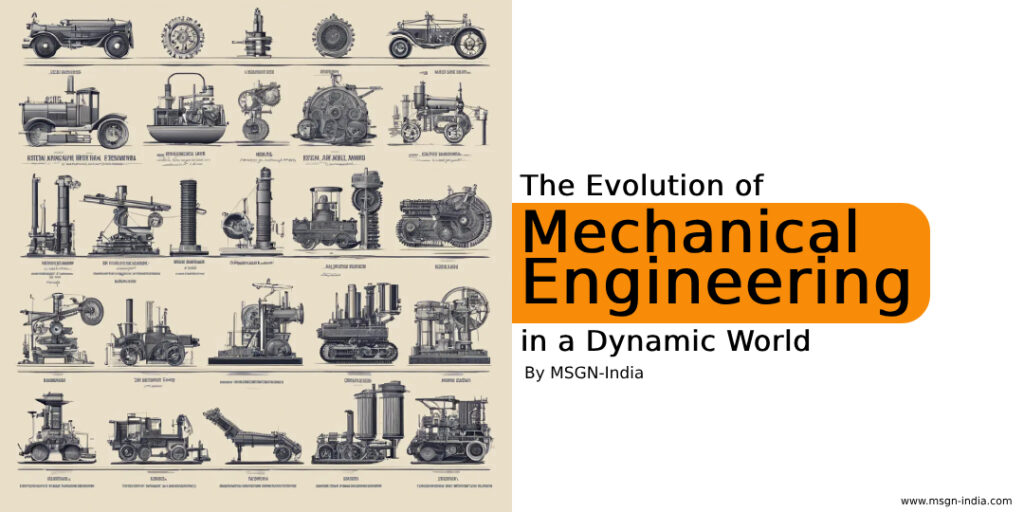
The Evolution Of Mechanical Engineering That Changes The World
In an era defined by technological innovation and rapid change. the field of mechanical engineering is undergoing a profound evolution that helping the world emerge.
As society grapples with complex challenges and embraces new opportunities. mechanical engineers are at the forefront of driving progress and shaping the future.
Let’s delve into the dynamic evolution of mechanical engineering and explore the key factors driving its transformation.
Technological Advancements
One of the most significant drivers of change in mechanical engineering is the rapid pace of technological advancement.
From robotics and automation to additive manufacturing and artificial intelligence, cutting-edge technologies are revolutionizing the way mechanical engineers design, analyze, and produce mechanical systems and components.
Innovations such as digital twin technology and Internet of Things (IoT) connectivity are enabling real-time monitoring, predictive maintenance, and optimization of mechanical systems, ushering in a new era of efficiency, reliability, and performance.
Interdisciplinary Collaboration
As mechanical engineering becomes increasingly intertwined with other disciplines such as electrical engineering, computer science, and materials science, interdisciplinary collaboration is becoming essential for addressing complex challenges and driving innovation.
Collaborative efforts between engineers from diverse backgrounds are yielding groundbreaking solutions in areas such as renewable energy, sustainable transportation, and biomedical engineering.
By leveraging insights and expertise from multiple disciplines, mechanical engineers are developing holistic solutions that address societal needs and advance human progress.
Focus on Sustainability
With growing concerns about environmental degradation and climate change, there is a heightened emphasis on sustainability within the field of mechanical engineering.
Engineers are exploring sustainable materials, energy-efficient designs, and eco-friendly manufacturing processes to minimize environmental impact and promote responsible stewardship of natural resources.
From designing energy-efficient HVAC systems to developing lightweight materials for automotive applications, mechanical engineers are playing a pivotal role in creating a more sustainable and resilient future for generations to come.
Shift Towards Digitization
The digitalization of mechanical engineering processes is transforming the way engineers conceptualize, design, and prototype mechanical systems.
Computer-aided design (CAD) software, simulation tools, and virtual prototyping techniques enable engineers to iterate on designs quickly, optimize performance, and identify potential issues before physical prototypes are built.
Additionally, digital twins and simulation-based design optimization techniques allow engineers to predict the behavior of mechanical systems in real-world conditions, enabling data-driven decision-making and accelerating the innovation cycle.
Globalization and Market Dynamics
The globalization of markets and supply chains is reshaping the landscape of mechanical engineering, presenting both opportunities and challenges for engineers.
As companies expand their operations globally and seek to tap into emerging markets, mechanical engineers must navigate diverse regulatory environments, cultural differences, and market demands.
Additionally, the rise of digital platforms and e-commerce is changing the way mechanical engineering services are delivered, creating new avenues for collaboration and competition in the global marketplace.
Embrace of Lifelong Learning
In a field as dynamic and evolving as mechanical engineering, lifelong learning is essential for staying abreast of the latest developments and advancing one’s career.
Engineers must continuously update their skills, knowledge, and competencies to remain competitive in the job market and contribute meaningfully to their organizations.
Whether through formal education, professional development courses, or self-directed learning, embracing a mindset of lifelong learning is crucial for thriving in the ever-changing world of mechanical engineering.
In conclusion, the evolution of mechanical engineering in today’s dynamic world is driven by technological advancements, interdisciplinary collaboration, sustainability efforts, digitization, globalization, and a commitment to lifelong learning.
As mechanical engineers navigate the complexities of an increasingly interconnected and fast-paced world, they are poised to play a central role in addressing global challenges, driving innovation, and shaping the future of humanity.
